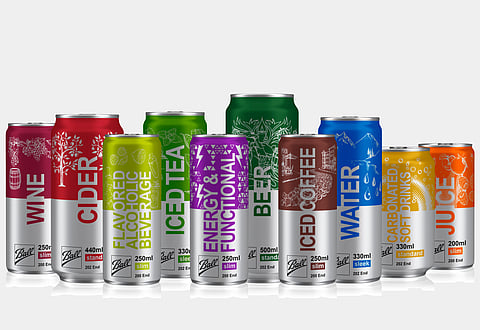
- Home
- EventsEvents
- Product Launches
- CategoriesCategories
- Advertise
- Opinion

Photo - Ball Beverage Packaging
Headquartered in Bengaluru, Ball Beverage Packaging India is a part of Ball Corporation, USA. The company manufactures innovative and infinitely recyclable aluminum beverage cans, including 185ml, 250ml, 330ml, 355ml and 500 ml. In India, Ball Corporation has been operating since 2006 and catering to all key brands in the Indian beverage market in various categories like carbonated soft drinks, juices, dairy, energy drinks, and alcoholic drinks like beer, wine, flavored alcoholic beverages, and hard spirits. The company also exports to South Asia, ASEAN, Africa, and the US markets. Ball Corporation and its subsidiaries employ 21,500 people worldwide and have reported net sales of US$ 11.8 billion in 2020. In an exclusive interview with FoodTechBiz, Manish Joshi, Director – Sales and Marketing, Ball Beverage Packaging India, highlights the importance of Aluminum cans as a sustainable and eco-friendly beverage packaging alternative.
FTB - Demand for Aluminum cans in packaging is rising. In your opinion, what are the main reasons behind this?
Manish Joshi - The reasons for the increase in India's consumption rates for metal packaging are the growing middle-income group population, changing lifestyles, convenience to carry, and evolving consumer preferences. Consumers are conscious of the environmental impact when buying any products.
The current penetration of aluminum cans in India is as low as one beverage can per head per annum compared to 70 cans in Vietnam, 40 cans in China, and 140 cans in Brazil. This data showcases tremendous potential in India to achieve its sustainability goals by shifting to aluminum cans as an eco-friendly beverage packaging alternative.
FTB - Please tell us about your manufacturing plants and your major investments in India?
Manish Joshi - Ball Beverage Packaging has made significant investments in India by setting up two state-of-the-art beverage packaging manufacturing plants; the Taloja plant on the outskirts of Mumbai, which was set up in 2006, and the beverage can manufacturing plant in Sri City, Andhra Pradesh in 2016. Ball additionally has an aerosol can plant in Sanand, Gujarat.
Our two high-speed manufacturing plants in Taloja (Maharashtra) and Sricity (Andhra Pradesh) and our product range include 500ml, 330ml sleek, 250ml slim. We have recently invested in 185ml slim and 250ml stubby as well. We also offer a range of innovations like Matt, Neon printing, HD printing, etc This helps brands differentiate in the marketplace. With most of the new product launches happening in aluminum cans, our infrastructure includes an in-house proofing machine which helps in expediting new brand launches.
Apart from the investment in the two plants to build our capacity, we have also invested in new pack sizes like 355ml std, 185ml slim, and 250ml stubby. This in line with our strategy to offer new pack sizes to grow the market.
FTB - COVID-19 has increased consumer awareness and commitment to buying sustainable products. What is the impact of the pandemic on your business?
Manish Joshi - We have seen an increase in cans' saliency, and sustainability has been one of the triggers for our growth. We have seen strong consumer preference towards hygiene and home consumption, driving consumers' shift to cans.
Manish Joshi, Director – Sales and Marketing, Ball Beverage Packaging India
FTB - Please name your major clients in the food and beverage segment?
Manish Joshi - We work among the big players in the industry, including Pepsi, Coke, ABI, and Heineken.
FTB - Regulatory bodies FSSAI and BIS are also evaluating to bring new beverages under can packaging. Please share more details about this.
Manish Joshi - The government bodies are seeing value in cans as they are infinitely recyclable. Having a higher mix of cans in different categories serves the customer's brand purpose and government objective of using sustainable packaging options.
FTB - Other than soft drinks, please tell us about other segments where the metal can packaging is getting more popular nowadays and why?
Manish Joshi - Metal packaging is well accepted in Beer and Energy drinks. This is due to its premium look, convenience, and easy storage. We are also seeing new beverage categories adopting aluminum beverage cans as their package of choice, including spring water, wine, and hard seltzers.
FTB - What is your take on the demand projections in India?
Manish Joshi - The penetration of cans in India is very low as compared to similar markets abroad. This presents a huge growth opportunity. We see that the youth-dominated nation wants to contribute to the environment and cans are a perfect choice. Unfortunately, there is a lack of awareness about the benefits of cans and its ability to be infinitely recyclable. We are working in different ways to create this awareness to make an informed choice. Currently, the preference for cans is growing faster than any other packaging format and we expect the demand to further pickup in the next two years.
FTB - Cost is a significant factor for any business; how do you rate metal packaging affordability compared to other packaging materials?
Manish Joshi - Packaging is the first point of consumer interaction for any brand. Hence the value provided at this touchpoint must be relevant. The metal packaging cost is higher than other packaging materials, but costs become more comparable once the benefits are calculated in the value chain.
FTB - Throw some light on your expansion plans.
Manish Joshi - Our vision for India is to target double-digit growth year on year. To cater to this, we would add new footprints and increase our capability by introducing new products and innovations.
